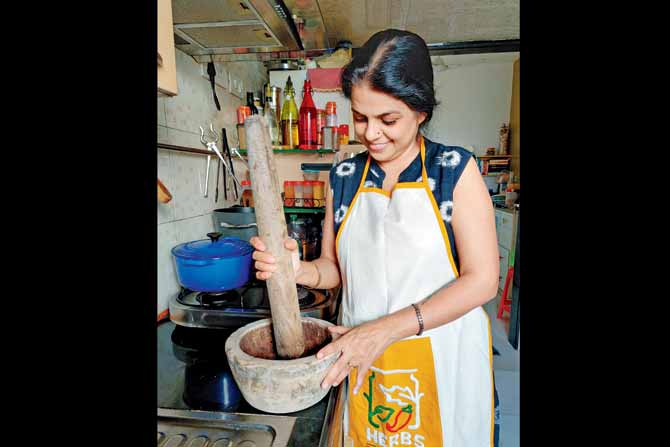
Sameer Joshi, co-founder of Especia Delight, a startup that supplies fish to households, says business has anyway dropped after the opening up of markets. Paying for WhatsApp will be an added cost
Like thousands of Mumbaikars whose jobs were upended during the lockdown, photographer Sameer Joshi too, was compelled to explore alternative sources of income. In May, he, along with four other friends, launched Especia Delight, a startup that supplies fish. "With sourcing and supply of fish and meat being affected due to closed harbours, there was great demand for this service," he says. According to reports, startups in the organised fish, meat and poultry space witnessed a 300 per cent growth in sales during the lockdown. Now, with the opening up of mandis and brick and mortar stores, Joshi's sales have fallen by nearly 40 per cent. He is relying on loyal customers to keep the business afloat. "Because we catalogue the day's fresh catch, send pictures and videos and give prompt updates about deliveries, customers like the service." Over 80 per cent of his business interactions are conducted over WhatsApp. "It's free, easy and convenient."
Recently, WhatsApp announced its plans to charge business customers. While users will soon have more ways to see the products that businesses have available and make direct purchases, the Facebook-owned app said, in order to make this a reality, they will start charging its business customers for some of their services. Currently, no information has been provided on which services or how much Facebook plans to charge. Facebook said it would use some of the revenue from business sales to continue to offer free services to its more-than-two-billion WhatsApp users worldwide. Joshi says the cost will be an additional expenditure, which he's not sure he can afford at this point. "It's also true that I can't do without WhatsApp. Honestly, it will entirely depend on what charges they levy and how much," he says.
ADVERTISEMENT
While they appear similar at face value, WhatsApp and WhatsAppBusiness are two separate apps. The latter is loaded with additional features such as automated messages, quick replies and business tools (you enter your business name, logo, contact information, description).

Dr Renuka Kamath, professor of marketing and associate dean at Bhavan’s SPJIMR
Dr Renuka Kamath, professor of marketing and associate dean at Bhavan's SPJIMR (SP Jain Institute of Management and Research) and professor Sheila Roy have been studying this new form of business interaction among small and medium entities across Mumbai and Bengaluru. "When the pandemic fell upon us and the lockdown happened, a new way of doing business emerged. People, especially those in 'skyrise markets' [a term coined by Kamath and her co-researcher], came together to buy in groups on WhatsApp. This group-buying took off at lightning speed, due to the sudden situation, trust in each other and ease of placing orders. The messaging service eased the formation of these groups," says Kamath. The type of ventures they analysed ranged from premium, niche, specialised products in fresh and processed foods to fresh home cooked simple or exotic meals, and other small businesses in the essential category. What they realised during their interviews with consumers and vendors, was how oblivious they were to their dependence on the platform. "They seemed to take it for granted. Many of those groups are now either continuing or have morphed into groups for sale of specialty foods or other items. Vendors are now using this model to expand to other 'skyrise' markets. Hence, my belief is that if WhatsApp begins charging, they will cut-off a lifeline that small businesses have just begun to get used to. It would be like WhatsApps cuts off the very stalk of a sapling that has just taken root."

Rashi Pacheriwala runs DD Gifts Company that’s into customising gifts. She says she can’t do without WhatsApp given the nature of her business that involves extensive coordination and detailed conversations with customers
Entrepreneur Rashi Pacheriwala runs DD Gifts Company that customises wedding favours and festive and corporate hampers. While her venture has a presence across social media platforms, she relies heavily on WhatsApp for all "conversational commerce" purposes. "The minute somebody confirms an order, we reach out to them on WhatsApp. Any sort of preferences or briefs are directly put forth. It's a closed, personal environment in which to communicate one-on-one." The reason she prefers this is because they can brainstorm on the customisation and the interactions are documented. WhatsApp charging services will certainly impact her business, says Pacheriwala. "It will be difficult to bear the extra cost, but we can't do without it, given the nature of our business. It [WhatsApp] comes with a high degree of ease because almost every person is there on the platform. They might not be on Instagram or Twitter, but they do have WhatsApp." Reports state that the app has the highest smartphone penetration rates—as high as 95 per cent in some countries, with unrivalled popularity in India.

Home chef Inderpreet Nagpal of Rummy’s Kitchen says she won’t be able to levy extra costs on her customers because they won’t understand
Homechef Inderpreet Nagpal, who runs Rummy's Kitchen, says it's incumbent on businesses to bear the additional cost. "In a space like hospitality and food, there's cut-throat competition. It's harder for a home chef to increase costs, because the perception is that 'you're not a restaurant or QSR, so why are you charging us more'." Independent business consultant Vani Gupta Dandia, who is founder of CherryPeachPlum Growth Partners, says charging for business was inevitable. "Today, everyone has WhatsApp, including a raddiwala and sabzi thelawala. At some point, they had to monetise, although who doesn't like everything free? However, the question is, how will WhatsApp provide more value to business accounts that pay? Will it make business/invoicing/payments easier? Will it offer reminders? Offer an e-wallet service? How can it become a more integrated all-in-one solution for easy business?"

Vani Gupta Dandia, founder of CherryPeachPlum
Emails and SMSes have long been the most common channels that businesses use to connect with their customers. While the former is a good way of communicating formally with a client, WhatsApp works well for a quicker response, believes Robin Chhabra, founder and CEO of Dextrus, a premium co-working space. He recently launched a new space in Lower Parel and often uses the messaging app to share images of their centre, short videos of their space with clients, who are pressed for time. "Emails quite often involve longer format responses. This slows down the process. Plus, your email might even find itself in spam or trash for no good reason. When one gets a WhatsApp message from a legitimate source and a personal message, that usually has more success as the connection is direct and real."
Srila Chatterjee, founder and CEO, Baro Market, thinks WhatsApp's "industry-agnostic" nature makes it preferable. That it's more or less accepted now as official, and is even admissible in a court of law, lends it legitimacy. According to Chatterjee, where it really helps is when people who look online to see what there is, also want to talk to someone one-on-one to be able to have a personal experience. After her Lower Parel store shut down in April, she decided to pivot from an offline to an online store. Currently, almost 50 per cent of her business happens via WhatsApp.
The perception that it's a safe medium has also prompted businesses to explore it. Kamakshi and Vishala Khurana are co-founders of The Sound Space, which helps children and adults achieve wellness through music and sound. "I think for our industry, which is mainly into education, a lot of the smoothness depends on our communication and our ability to make sure that all information is passed on accurately," they say.
According to tech experts, what the medium lacks at the moment is payment diversity, WhatsApp enables only one payment option i.e. UPI payments; you can only have one business account, and that account can only be active on one device at a time. Dandia says a crucial question will also be security. "Telegram and Signal are far more secure. 'How can WhatsApp provide greater reassurance on safety?' will be a critical driver to business. Because it's also the extension of messaging to other services that will be the natural business acquisition channel."
Keep scrolling to read more news
Catch up on all the latest Mumbai news, crime news, current affairs, and a complete guide from food to things to do and events across Mumbai. Also download the new mid-day Android and iOS apps to get latest updates.
Mid-Day is now on Telegram. Click here to join our channel (@middayinfomedialtd) and stay updated with the latest news
 Subscribe today by clicking the link and stay updated with the latest news!" Click here!
Subscribe today by clicking the link and stay updated with the latest news!" Click here!







